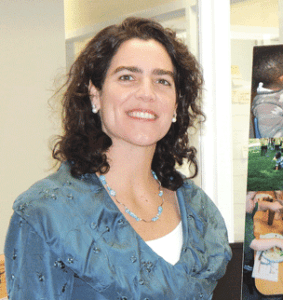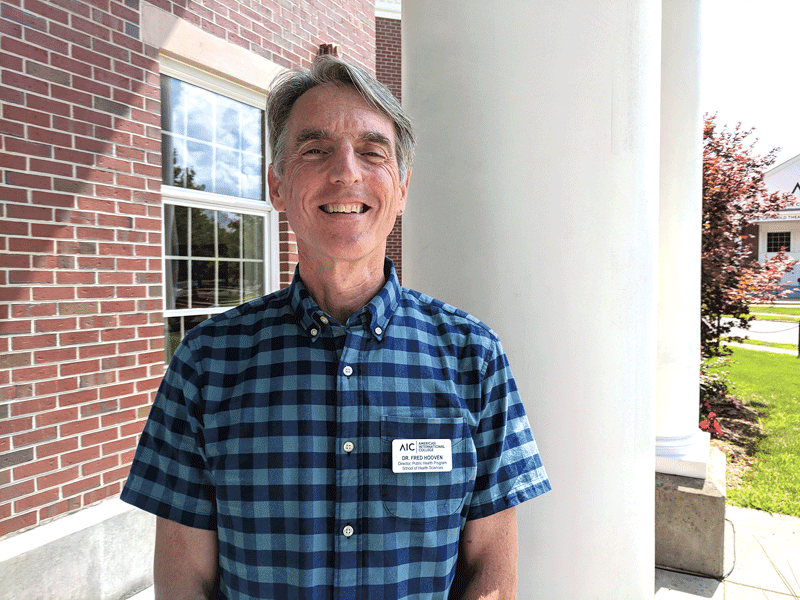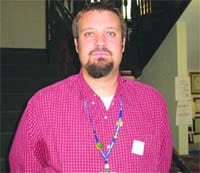Maximum Impact – Careers in Public Health Are Growing in Importance
There’s more than one way to tackle teenage smoking, Scott McPhee said.
For a health professional who works in the clinical realm, a young person might present with a chronic cough. While treating the obvious symptoms, the provider might use the visit as an opportunity to encourage the patient to stop smoking, and maybe recommend resources available to help him do that. If he follows through, then one life was changed for the better.
“But if you’re coming at it from a public-health approach, you might put together an anti-smoking campaign, or meet with organizations or lawmakers to change policies with regard to smoking, or you might work with high schools or middle schools to do education programs.”
McPhee, professor and interim Public Health program director for Bay Path University, didn’t stop there. As another example, he cited fears over the Zika virus.
“If someone comes back from overseas with Zika, a clinical professional will treat that person’s symptoms, whereas a public-health professional is looking at entry points and how it’s transmitted and trying to take different avenues to offset that transmission.”
As students who enroll in Bay Path’s new master of public health (MPH) program quickly realize, McPhee said, the possibilities for making an impact on an entire community’s health are broad and diverse.
“Public-health careers are often misunderstood because the field can be difficult to define,” he added. “At one level, public health involves medical care provided within a community and outside a hospital setting. In a different context, public health can have local, regional, national, and global repercussions and refer to efforts to prevent epidemics and improve the health of entire populations.”
When some people think of health, he noted, they think of doctors and nurses who see patients with problems, and public-health professionals tend not to be in the public consciousness except during crises like Zika flareups or the water crisis in Flint, Mich. — incidents that demonstrate that there’s more to the healthcare world than one-on-one patient-provider interactions.
“It’s one thing to care about your family, but you really should care about the community as well,” he told HCN. “The health of your family is directly related to the health of the community.”
Jessica Collins understands this better than most, as executive director of the Public Health Institute of Western Massachusetts, which has long studied the social determinants of health — social and economic resources such as housing, education, food access, and transportation — and worked to conduct research, build coalitions, and influence public policy to create healthier communities.

“Public health has a very broad range of applications — everything from the regulatory realm to broad public policy,” Collins said, noting that the regulatory side alone deals with matters ranging from food testing to animal control to water safety, just to name a few. “It’s an exciting field because the realms are very different, and they require different expertise. A lot of people with different passions and interests and skills can be successful in public health.”
Divergent Paths
American International College launched an undergraduate program in public health in 2013 and is planning a master’s track starting next year. About 65 students have graduated from the program in all, and have gone on to a wildly diverse range of careers, said Fred Hooven, director and associate professor of Public Health at AIC.
For example, one graduate took a job with the Infectious Disease division of Baystate Health, working with HIV/AIDS patients as a healthcare outreach worker. Another got a job with a medical technology company. A third interned at Martin Luther King Jr. Family Services in Springfield, organizing high-school students to campaign on various health initiatives, before being hired there; now, she’s working for the city on an opioid project. A fourth is working for Gardening the Community, also in Springfield.
“What I tell students is, if you want to be a nurse, you would Google ‘nurse’ and the city or town you want to work in, and the jobs would pop up,” Hooven said. “But if you want to work in public health, you have to think more broadly. Think about the kinds of work you want to do, and listen to the alumni we bring back.”
Embarking on a public-health degree, he admitted, can be a bit of a leap.
“I get this question often from parents: ‘what do I do with a public-health major?’ I say, ‘well, ask your student, once they’ve gone through some of the program, what they would like to do.’ Hopefully, through the course of the curriculum, they develop a direction, because a lot of the students who come to us don’t have a set direction, and one of our tasks is to help them find that.”
What they do share, he said, is a desire to make a difference, and they’ve heard enough about the various career options to know they’ll eventually find a niche.
“It’s not like history, it’s not like biology — it hasn’t been around as an undergrad discipline long enough for students to be talking about it in the high schools. Maybe they are starting to talk about it now, which would be great,” Hooven told HCN. “But I’ve seen their eyes open when they’re in class.”
Historically, Collins said, the main focus of public health was the regulatory aspect, but over the past few decades, it’s moved more into the public-policy realm — with much success. “We’ve been able to change things like seatbelt laws and bike helmets and pushing for water safety and taxes on sugar or tobacco — the sin taxes.”
In particular, her organization has become the regional voice on issues of health equity, which is something that appeals to Hooven’s former student who worked at Martin Luther King Jr. Family Services.
“He’s not from Springfield, but he became very committed to living in Springfield and working on the social determinants of health, on the things that really affect our health, that are at the root cause of so many health problems in the U.S.,” Hooven said. “One big focus of public health today is on the inequity, and the fact that some people have access to the best healthcare in the world, and have great health outcomes, and in other pockets of the U.S., we have health outcomes that look like some countries that are still developing. Students get turned on by the idea of having an effect on those social determinants, that they can really change a lot.”
That said, a public-health degree is not a straight line to a particular career, he noted, comparing the track to that of, say, occupational therapy.
“They know they’re going to be occupational therapists; they know exactly what places hire occupational therapists. In public health, you’re gaining an understanding of all the dynamics involved in the social determinants of health, the things that influence the health of populations, along with the critical-thinking skills you need as an undergrad. And in the process of getting that degree, you find some direction, too.”
McPhee agreed. “Public health is what you make of it,” he said. “When you’re looking for a job, you need to be looking from a broad perspective. If you’re just looking at public-health agencies, that’s a myopic way to go about it.”
Crossing Over
Indeed, Bay Path’s program is designed to prepare graduates not only for positions at public-health agencies, but as leaders in government, business, industry, higher education, and nonprofit organizations. For those aspiring to high-demand careers such as epidemiologists, environmental health specialists, public-health policy advisors, advanced health educators, and health survey researchers, a public-health degree is typically a requirement.
“Clinical medicine and public health are like cousins,” Hooven said. “Someone in clinical medicine has a patient: ‘you come and tell me the symptoms, I’ll treat whatever the problem is — give you medicine, maybe instruct you on risk factors that pertain to you. Then you go out the door.’ Public health has more of a population focus. We deal more with disease prevention and health promotion. We don’t look at it on an individual basis as much.”
That said, he has seen medical professionals on the clinical side seek an MHA degree, such as a medical technologist who worked in a lab, who became interested in moving beyond individual diagnostic issues into looking at the broader picture or what’s happening in the community, and across different demographics of the community.
Meanwhile, a nurse might want to pursue an MHA to take a job in a city or state public-health department, while a primary-care provider who works in infection control in a hospital may desire to work with infection issues across a broader spectrum than individual patients.
Hooven said students often find their passion — and eventual career path — through the internships and capstone projects they take on, and they’re often surprised by some of the possibilities.
“The traditional areas were always local public health, state public health, and working on public-health initiatives through hospitals, not-for-profit organizations, and local community groups,” he said. “But there are a lot of people in public health working in the for-profit sector. I worked for MassMutual when they had a health-insurance division, and the division was run by someone with a public-health degree. Then I worked as a healthcare administrator for several years. You’ll see people who cross over a lot.”
Those internships, projects, and alumni visits do more than plant seeds of career ideas; they often spark real passion in students.
“One student came back and said, ‘I’m working on environmental racism.’ I didn’t teach her that term, but I thought, ‘wow, she’s so enthusiastic about this.’ The community has been central in turning the students on, whether it’s the people at the Martin Luther King center, at Baystate, at Mercy, in a number of different organizations — they’ve really opened students’ eyes to the social problems that are at the root of our health problems.”
And those problems are driving significant growth in college programs, he added. “Those of us who are creating these programs know we are filling a niche — filling a need, really — both for students and for employers like hospitals and cities and public-health departments.”
Change Agents
That need is being driven by the emergence of the accountable-care era, in which hospitals and healthcare providers are being paid according to patient outcomes, not by the number of tests and procedures they order. That has placed a far greater emphasis on community and population health — a development that’s been a long time coming, Collins said.
“There’s much more going on now with the connection between public policy and the trend of healthcare in our country,” she said of the move toward preventive care. “Now it’s a totally different feeling, where you’ve got the healthcare sector looking to public health for solutions. That’s really exciting.”
The evolution of accountable-care organizations (ACOs) may create more opportunities in public-health careers, Hooven said, in that third-party payers may begin covering services they didn’t before, such as programs run by community health workers.
“The shift to ACOs should allow insurers to pay for things that keep people healthy and save money for the system,” he told HCN. “We’re getting there — it’s still not fast enough, in my opinion, but we’re moving in the right direction, toward aligning the financial incentives with what’s good for all of us, the health of populations.”
For people who want to work toward that goal of healthier communities — in myriad ways — McPhee said a public-health degree just makes sense.
“Public health is everybody’s business,” he concluded. “If you want to see positive changes in healthcare, you have to become that change agent.”




